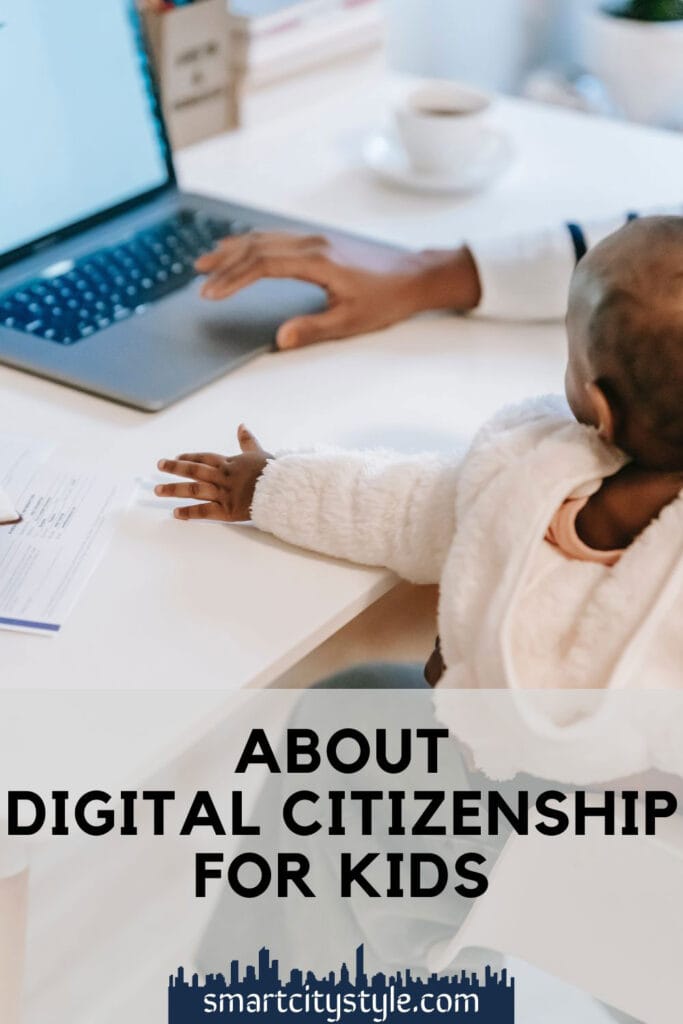Digital Citizenship for Kids
Teaching your kids about responsible use of technology or how to be good digital citizens should be a priority in this day and age. According to a study by Stanford University, digital citizenship for kids is a process that’s starting at an incredibly early age nowadays.
What Is Digital Citizenship?
Digital citizenship is the art of using digital technology and social media in a responsible and safe manner. It’s about keeping ourselves safe online and how we use our digital tools, such as social media, in relation to others. Digital safety is not just about ourselves but also about those we interact with online.
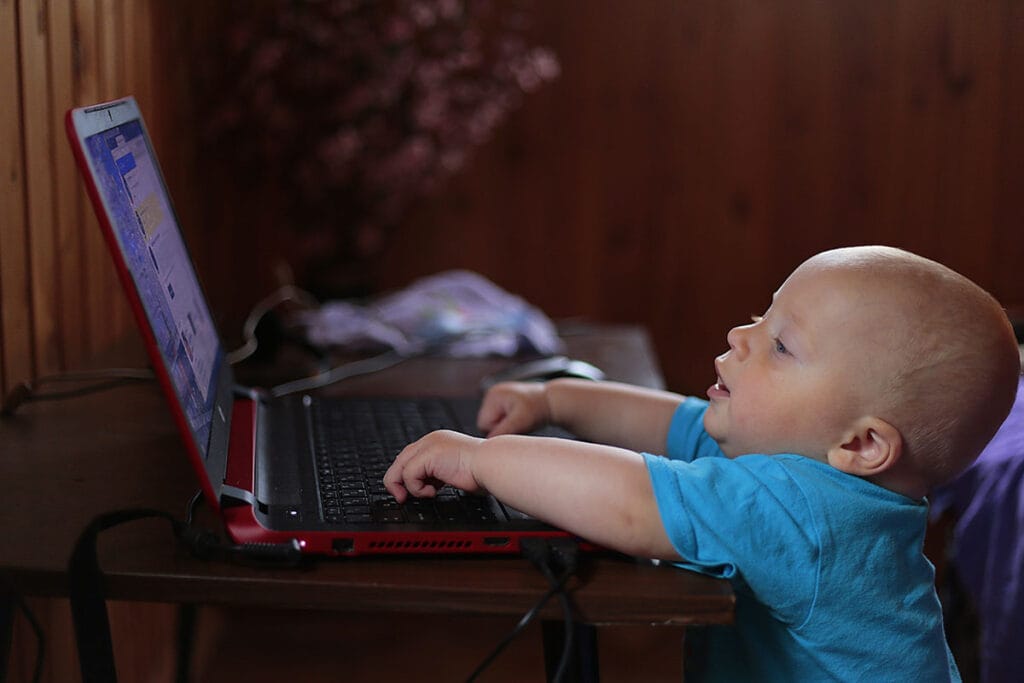
The Stamford University study mentioned above shows that about 25% of all kids have a smart device, like a phone, by the time they are 10.7 years old. The same study shows that 75% of kids have smart devices by the time they are 12.6 years old, and that of all these kids, 99% have smartphones.
This shows just how early kids are getting introduced to the digital world. It also highlights how important it is to teach your kids responsible digital citizenship.
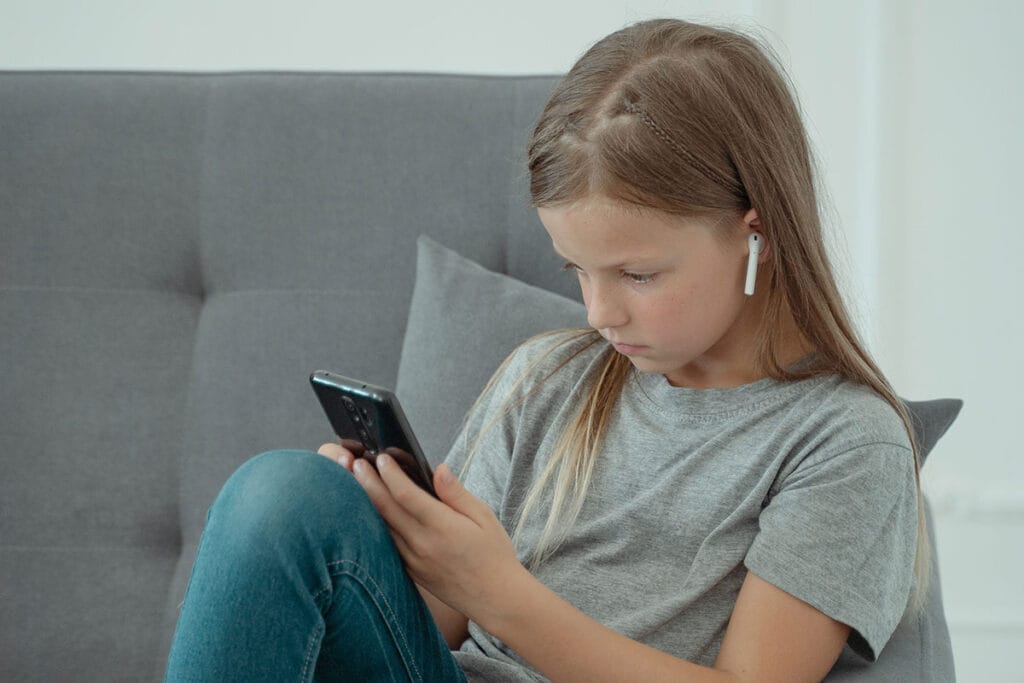
According to research, one out of every five Americans (both adults and children) has been subjected to severe online cyberbullying. Positive digital citizenship looks to minimize such incidences.
A digital citizen, therefore, is someone who regularly uses the internet for their own good and embraces all that this level of connectivity through information technology has to offer. A good digital citizen is mindful of everything they do online, including what they post, how they interact with others, and the content they consume and share.
Why Should Children Be Taught About Good Digital Citizenship?
Digital literacy is an integral part of the world we live in today. Children use digital technologies for a wide variety of purposes, including:
- Digital learning
- Remote learning
- Entertainment
- Playing
- Communicating with both teachers and friends
- Homework
Digital citizenship has quite literally become a part of their lives, and they only immerse themselves deeper into this world the older they get. Just as the real world has laws and “terms and conditions” for being a citizen of Earth, being a digital citizen also comes with its own set of rules and regulations.
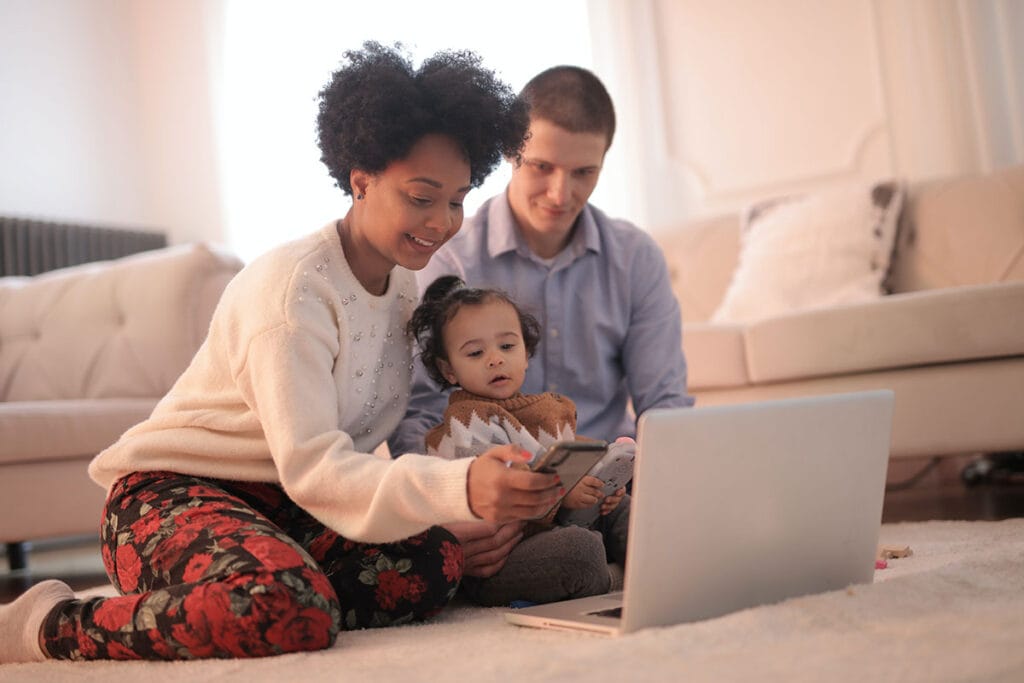
Some websites and platforms have strict terms and conditions that every member of the virtual community must follow. Failure to do so will see the offending member banned from that community, not unlike being banned from society by being sent to jail in the real world.
As such, equipping your kids with the digital skills to put information technology to good use is simply not enough. You must also guide them and equip them with the moral aptitude to thrive as a digital citizen of the world. You must show them how to:
- Keep themselves safe online
- Behave responsibly when virtually interacting with others
- Protect their self-identity
This will teach them to be good digital citizens and help them curate their digital footprints, which will help them use their digital presence as an asset in future endeavors.
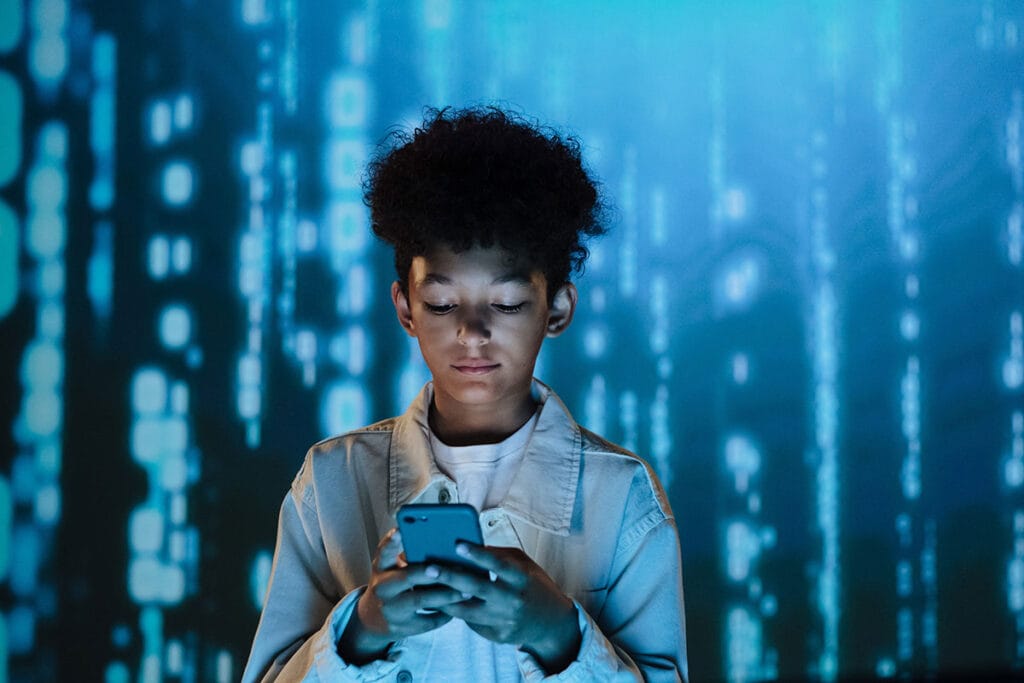
This is particularly true in a world where HR departments have no qualms about checking the social media handles of potential candidates and basing their hiring decisions on what they find there just as much as on the candidate’s educational achievements.
Digital Citizenship Skills Every Kid Should Learn
With the world increasingly heading towards a digital existence, digital literacy has become quite as important as the ability to read or numeracy.
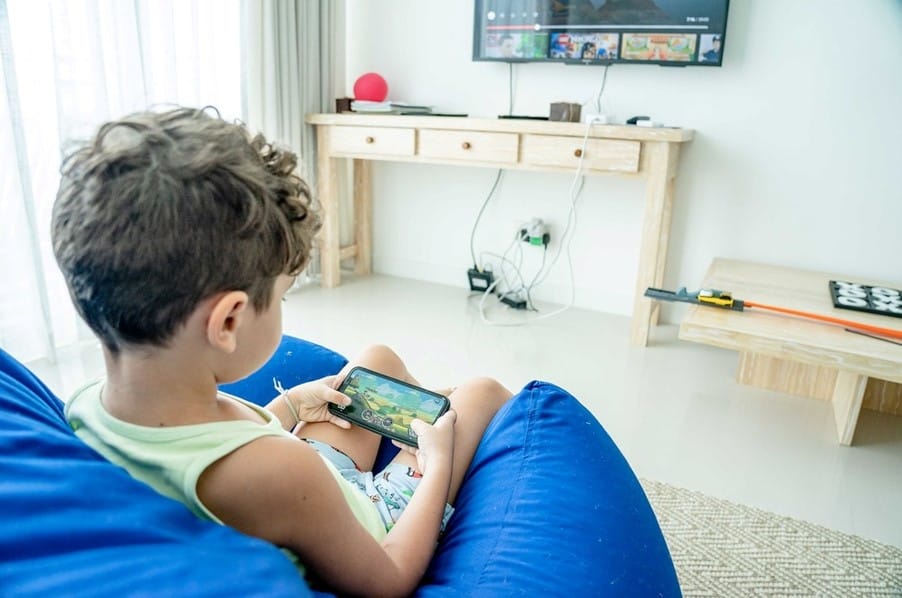
As such, we should take the time to teach our kids digital literacy and how to be good digital citizens. With that in mind, here are some digital citizenship skills to teach your child or children today.
Important Digital Citizenship Lessons for Every Child
Let’s assume that your kids know how to use computers and are already on social media. This means that they already have a specific platform that they frequent and where they interact with either their actual friends or virtual friends.

If this is the case, you don’t have to start with the basics, such as choosing which social media platforms to use and how to use a computer. You simply need to teach them how to be good digital citizens. With that in mind, here are some important lessons on how to be a good citizen online.
Think Before Posting
Many cyberbullying incidents occur because most bullies know they are hiding behind a screen and a pseudonym. As such, they can easily say things that they wouldn’t feel comfortable or confident enough to say in real life.
As a responsible digital citizen, the first thing your child should ask themselves before posting anything online is, “Would I be confident or comfortable enough to say this to this person’s face in real life?”
They should think of all the possible scenarios. Cyberbullying often occurs in the comment sections. They should assume they are in a class discussion with all their friends and schoolmates in the same room. Would they be comfortable saying what they are about to post? If the answer is no or maybe, then they should not post it.
It is also advisable to avoid posting anything on personal social media pages when emotions are running high. Just as we are bound to say something we would regret in real life when we are emotional, we are more likely to post something we regret online.
Keeping this perspective will make it easier for your child to build a strong and well-balanced digital presence.
Take Privacy Seriously
As a parent or a guardian, teaching your kids that just because something is shared on social media doesn’t necessarily mean that it should be there for the whole world to see will go a long way in helping to improve their online safety.
Teaching kids how to stay on top of their privacy settings should be a priority. The right kind of privacy setting will ensure that only the people with whom they are comfortable can see their content or even interact with them on social media.
It’s advisable to spend at least an hour every six months or so reviewing the privacy settings on all social media accounts and other online platforms we frequent.
Password Protection
Back in 2018, about 30 million Facebook accounts were compromised, and hackers were able to access the personal information of about 15 million of these accounts.
The truth of the matter is that accounts, be they social media accounts or even bank accounts, get compromised on a daily basis. Hackers use the personal information gathered for a wide range of purposes, including identity theft and cyberbullying.
It’s not uncommon for someone to hijack someone else’s social media account and use it to not only post profanity but also attack or cyberbully their followers.
The best way to avoid this is to take password protection seriously. Here are some tips on how your kid can keep their passwords safe:
- Use a different password for each social media platform
- Change and update their passwords frequently
- Avoid sharing their passwords with anyone
- Avoid signing in using a Facebook or Google account to log in on other platforms or websites
- Avoid using common passwords, and keep the passwords used as unique as possible
Numerous password management tools online come in handy once those passwords become too many or too complex to remember. Using these password management tools is a great way to ensure your kid can create unique and lengthy passwords without fear of forgetting them.
Avoid Oversharing
We live in a world where a lot of people find it satisfactory to show off online. Many of these people share an obscene amount of personal information online, and they even post videos of their homes and the contents therein.
This makes it easier for burglars to target such people since they already have a virtual inventory of everything they own. To make matters worse, these are the same people who will post their location at every turn, making it easy to know when they are not at home.
As a parent teaching digital citizenship to your kids, it’s important to reiterate the need for privacy and to avoid oversharing. Some details about your children should never be shared on social media. These include:
- Home address
- Live locations
- Full names
- Cars and car registration numbers
If they are old enough to have bank accounts, they should also refrain from sharing their financial information.
Oversharing online, however, isn’t just about posting personal information. It’s also about posting personal thoughts. While most people go online to air their views and “find their voice,” this can be a double-edged sword. Not everyone is a good digital citizen, which means there will be some negative reactions to anything your kids share online.
Teaching them to minimize how much personal information they share will go a long way in keeping their mental or emotional well-being protected.
Important Digital Citizenship Resources
Just like in regular school, some learning resources are designed to help children and adults become responsible digital citizens. Here are a few of the most practical digital citizenship resources to use.
National Association for Media Literacy Education
The National Association for Media Literacy Education is a free resource that is committed to guiding digital citizens toward a wholesome online existence. Apart from the training material, the platform offers excellent advice on key subjects such as building resilience online and spotting misinformation on important societal issues.
Common Sense Media
This is a platform for parents. The community on Common Sense Media reviews most, if not all, of the popular material online. This gives you a clear idea of what they are before your kids get into them. This way, you know what to allow and block from your home.
IKeepSafe
iKeepSafe is an “Internet Keep Safe Coalition” that provides certification for digital products sold online. This coalition ensures that digital products are not only compliant with federal and state requirements when it comes to handling personal information but is also safe for your kids to consume.
Most countries have their own digital citizenship resources that are designed to help keep their children safe when they are online and guide parents on how to educate kids on how to stay and remain safe when using digital devices.
For example, New Zealand has a platform called “NetSafe,” which goes a long way in helping those who have experienced cyberbullying. Through NetSafe, you can call and talk to a professional counselor if you have been cyberbullied and are looking for ways to cope. The platform also has a host of resources to help parents keep their children safe online.
Teaching your kids that there will always be digital drama is important. Like in real life, there are many different personalities online, and these personalities don’t always get along. It’s their responsibility as good digital citizens to avoid needless confrontation and try as much as they can to create a safe and caring environment when interacting with others online.
Conclusion
Responsible digital citizenship for kids isn’t something that you can impart in a single day. These lessons should be ongoing, just like most other life lessons. Mostly because your child’s digital needs will change as they grow, and the dangers online will grow with them. Giving them a good foundation for responsible online behavior will make it easier for them to remain safe and protected no matter how much that digital environment changes.
Inspired? Pin it!
